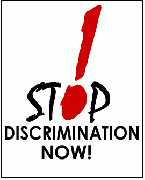Discrimination based on race, gender or sexual orientation is apparently getting worse in Michigan, respondents in a recent poll commissioned for the Michigan Roundtable for Diversity and Inclusion say.
The poll showed that 46 percent of Michigan residents said people of color have worse education and employment opportunities than white people (compared to 41 percent saying they have the same opportunity); and more than half of voters (53%) said that discrimination against gay, lesbian, bi-sexual or transgendered individuals is prevalent, with 20 percent saying it happens “all the time” and 33 percent saying it happens “frequently.” The percentage of people that say this is up from 41% a year ago.
Perhaps most discouraging, the number of voters saying that people of color have worse opportunities when it comes to education and employment compared to whites has increased from 32 percent in 2008 to 46 percent in 2010.
“In an age where diversity must be seen as critical to the success of any company seeking to compete nationally or globally, Michigan is moving backwards in the eyes of its own people when it comes to discrimination,” said Thomas Costello, president and CEO of the Michigan Roundtable. “These findings have deep consequences for our state as we seek to pull ourselves out of our current economic depression, and build a more inclusive community that ensures opportunity for all.”
John Powell, Executive Director of The Kirwan Institute for the Study of Race and Ethnicity at the Ohio State University noted, “This survey is important as it captures the perceptions of the citizens of Michigan on the important issue of opportunity, based on race and gender. It shows that both blacks and whites share a growing perception that opportunity is eroding for people of color and women.
While this could be seen as negative, it may be better to see this as a clear-eyed perspective on the disturbing reality. There is much data to suggest that opportunity is, in fact, eroding. There continues to be a racial divide in perspective on this issue, and this should be a cause for concern. Whites are only half as likely as blacks to believe that discrimination continues to be a problem. It is important to try to better understand the cause of this divide in order to measure it with reality. The Michigan Roundtable should be applauded for doing this important, if uncomfortable, work in Michigan.”
The survey is the third conducted annually by Mitchell Research & Communications, Inc. for the Michigan Roundtable. All three surveys have asked about discrimination against women and people of color; the last two have asked about discrimination based on sexual preferences. Support for this survey was provided by the Ford Foundation.
The 2010 surveys shows that African Americans are almost twice as likely as white respondents to say racial discrimination happens and that women are far more likely than men to say that gender discrimination is prevalent. The poll showed 58% of African Americans saying racial discrimination happens all the time (31%) or happens frequently (28%). That compares to only 33% of white respondents saying that racial discrimination happens all the time (11%) or happens frequently (11%).
The percentage of blacks that said discrimination continues all the time or frequently dropped from 53% in 2008 to 51% in 2009 after the election and inauguration of President Obama.
Nearly half of women say discrimination happens “all the time” (19 percent) or frequently (30 percent), compared to only about a third percent of men (12 percent “all the time,” 21 percent “frequently.”)
“This important research shows discrimination is something people recognize is still a fact in our world – and those most likely to be discriminated against feel it most strongly,” said Costello. “It also shows that despite the rhetoric of some, racial discrimination is widely recognized as happening often – and perhaps increasing, in the eyes of people of color –despite the election of our first black president, Barack Obama.”
African Americans are increasingly becoming discouraged about their opportunities to get ahead. The 2010 survey found 77 percent of African American respondents said people of color have worse opportunities in education and employment than whites, up from 53 percent in 2008. At the same time, white respondents also perceive that opportunities for people of color have diminished over time. In 2008, 29 percent said people of color had worse opportunities; that has increased to 43 percent in the 2010 survey.
In another indication of growing concerns about discrimination in the African American community, the percentage of African Americans saying the quality of life for people of color has gotten better over the last 10 years has slipped from 58 percent in 2008 to 40 percent in 2010. And the percentage of those saying we will “never” achieve racial equality has increased from 29 percent in 2008 to 49 percent in 2010. Today, only 2 percent of African Americans polled said we have equality now; 16 percent say we will have it “in my lifetime” and 23 percent said “in 100 years.”
“I don’t want to overstate the importance of this issue, but there is a bubbling cauldron of discontent that Michigan’s leaders would do well to address,” said Costello. “Our survey only measures attitudes and doesn’t test solutions. But policymakers at the state and regional levels must begin paying more attention to the underlying racial tensions in our society.”
Full results of the survey are available at www.miroundtable.org.






Leave a Reply